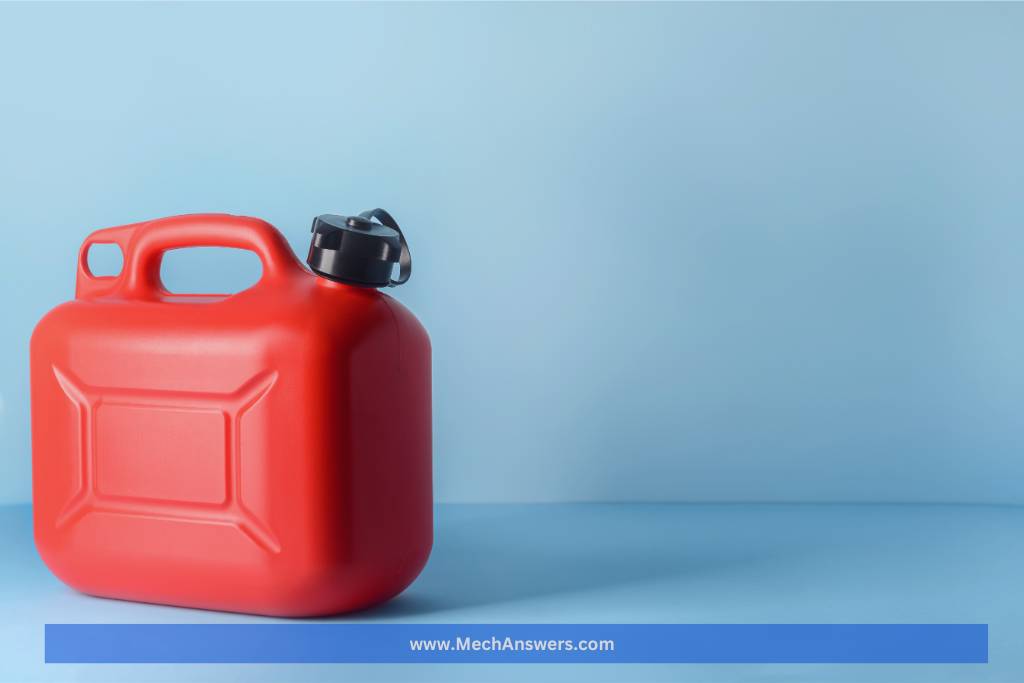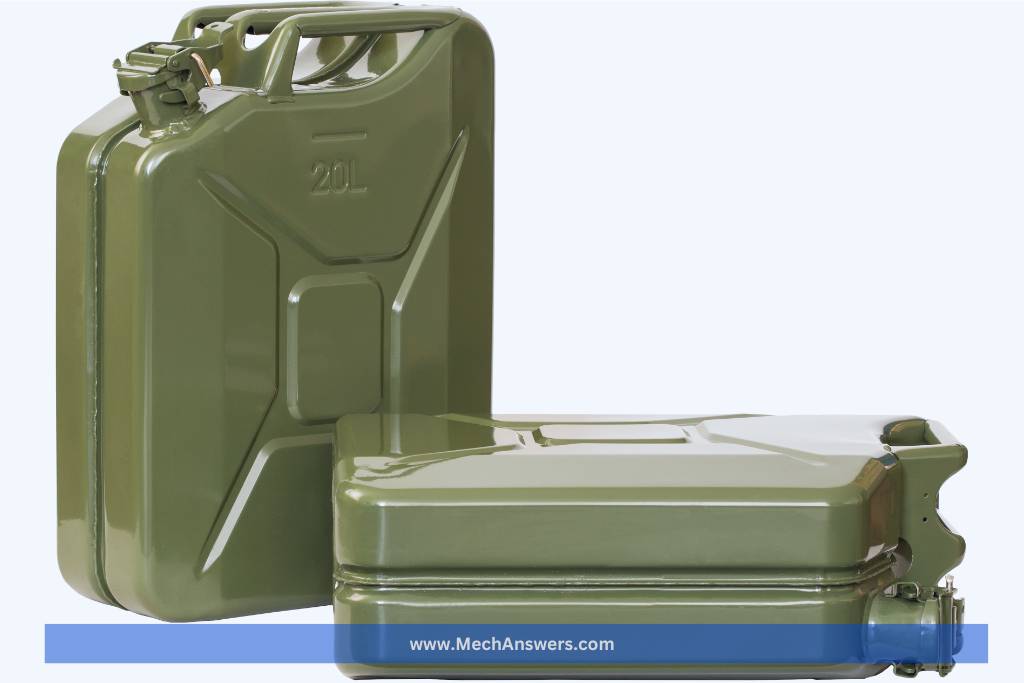“Storing Gasoline in Summer” Ever found yourself typing this into a search engine, hoping to get a comprehensive guide on the subject? Well, your quest ends here. In this article, we will unravel the best practices for storing gasoline during the warm summer months.
So, what’s the deal with storing gasoline in summer? Essentially, you’ll need to consider factors like choosing the right container, picking a safe location, and limiting the storage period. Each of these factors plays a crucial role in ensuring that the stored gasoline remains stable and safe throughout the summer.
Let’s delve into the details. By reading this article, you’ll gain invaluable knowledge to confidently handle and store gasoline in a safe manner.
Table of Contents
Factors To Consider For Summer Gasoline Storage
Increased Volatility
During the summer months, the temperature can significantly affect the volatility of gasoline. High temperatures can cause gasoline to evaporate more quickly, leading to higher pressure inside the storage container.
Therefore, it is vital to keep gasoline in a well-ventilated area during the summer to avoid any pressure build-up that could lead to a hazardous situation.
Proper Sealing
A quality container seal is crucial to ensure gasoline storage safety during summer. Since gasoline vapors can escape from poorly sealed containers, this could pose a serious fire hazard. Make sure your gasoline storage container has a sturdy, well-fitted cap that prevents leakage of fumes.
Optimal Container Type
The type of container you use for storing gasoline in the summer also matters. Gasoline should be stored in a UL-approved container, typically made from metal or heavy-duty plastic, and designed specifically for gasoline storage. These containers are built to resist heat and prevent leakage, providing a safer storage option.
Direct Sunlight Exposure
One of the most significant factors in summer gasoline storage is exposure to direct sunlight. This exposure can significantly increase the temperature of the gasoline, leading to increased pressure inside the container. Always store gasoline in a cool, shaded area where it is not exposed to direct sunlight.
Safe Storage Location
The location of your gasoline storage is another factor to consider in the summer months. It is advisable to keep gasoline stored outside your living area in a detached garage or shed, where it won’t pose a risk to your home in case of a spill or fire.
Ensure that the storage area is well-ventilated, cool, and away from any sources of heat or ignition.
Regular Inspection
During the summer, it’s essential to regularly inspect your gasoline and its storage container. Look for signs of damage to the container, and leaks, and check the gasoline for any discoloration or foul odor, indicating it has become degraded.
If any issues are detected, dispose of the gasoline safely according to local regulations and replace the container if needed.
Storage Time Limit
Even with all precautions, gasoline should not be stored for extended periods, especially during the summer months. As a general rule, gasoline should be used within six months of purchase, as it starts to degrade after that, even with the use of fuel stabilizers.
If you have gasoline that you’ve been storing from the winter or spring, make sure to use it up before the peak of summer hits.
In conclusion, while gasoline storage can be convenient and necessary for various reasons, it is important to follow these guidelines during the summer months to ensure safe storage.
By understanding and addressing these factors, you can safely store gasoline in summer, reducing the risk of accidents and maintaining the quality of your gasoline.

How to Store Gas Safely In The Summer
Selecting The Right Container
First and foremost, the right type of container is crucial when storing gasoline, especially during the summer months.
Use only containers approved by Underwriters Laboratories (UL) or any other recognized standard-setting organizations. These containers are designed specifically to withstand harsh conditions and prevent leaks or spills.
Proper Sealing
The container’s seal is another important factor. Ensure the cap fits tightly to prevent the escape of gasoline vapors, which are highly flammable. Always double-check to ensure the container is sealed properly before storing.
Storing In A Cool And Well-Ventilated Area
Temperature plays a key role in storing gas during the summer. As temperatures rise, so does the pressure within the gas container. Thus, it’s important to store gas in a cool, well-ventilated area, ideally out of direct sunlight. The cooler the storage area, the safer and more stable the gasoline will be.
Keeping The Container Elevated
Store the gas container off the ground on a stable platform. This helps prevent any potential damage or puncture from the rough ground or any small animals. Keeping the container elevated also aids in detecting any potential leaks or spills.
Avoiding Ignition Sources
It’s critical to store gasoline away from any potential ignition sources, such as electrical equipment, open flames, or any area where sparks could occur. Gasoline vapors are extremely volatile and can ignite easily, leading to fires.
Regularly Inspecting The Storage Area
Make it a habit to inspect your gasoline storage area regularly. Check the container for any signs of damage or leaks and ensure the cap is still tightly sealed. Regular inspection can help identify potential problems before they become serious safety hazards.
Using Stored Gasoline Timely
Gasoline should not be stored for too long, especially during the summer months. Ideally, try to use stored gasoline within six months, even if it has been treated with a fuel stabilizer. Old gasoline can lose its combustibility and might damage your engine.
In conclusion, while storing gasoline in the summer can be a bit more challenging due to the heat, it’s entirely doable and safe if you follow the correct procedures. By taking these precautions and regularly inspecting your stored gasoline, you can ensure a safe and efficient fuel supply all summer long.

Which Container Is Suitable for Storing Gasoline During the Summer?
The Importance of Correct Containers
Choosing the right container to store gasoline in summer is crucial for safety and the quality preservation of the fuel. Containers designed and approved specifically for gasoline storage are the best choice to ensure safety and the fuel’s integrity.
UL Approved Containers
Underwriters Laboratories (UL) approved containers are a go-to choice for storing gasoline. They are typically made from high-density polyethylene or metal and are designed to withstand the volatile nature of gasoline.
These containers come with special features like flame arrestors, self-venting, and child-proof caps that provide an added level of safety.
Gas Can Sizes
Gasoline containers come in various sizes, typically ranging from one to five gallons. The ideal size depends on the intended use of the stored gas.
For small power tools or emergency reserves, a one to two-gallon canister would suffice, while for larger equipment or vehicles, a five-gallon canister may be more appropriate.
Fuel Stabilizer
When storing gasoline in summer, the fuel is at risk of degradation due to evaporation and oxidation. It’s therefore recommended to use a gasoline container with a fuel stabilizer, which can extend the fuel’s shelf life. Adding a fuel stabilizer to the gasoline can prolong its life for up to 12 months.
Color of The Container
Gasoline containers are generally red in color, following the industry standard. This helps in the quick and correct identification of the contents. The red color indicates the presence of gasoline, which is important for safety and prevents the gasoline from being mistaken for a less volatile fluid.
Avoid Using Unapproved Containers
Storing gasoline in unapproved containers such as glass bottles, plastic milk jugs, or non-resealable containers can be dangerous.
These containers can break, leak, or allow the gasoline to evaporate. Unapproved containers lack the safety features found in UL-approved gasoline containers and should be avoided.
In conclusion, storing gasoline during the summer months requires attention to safety and fuel preservation. Choosing an approved, appropriately sized container, and using a fuel stabilizer can significantly improve the safety and longevity of stored gasoline.
Can Gas Get Flammable From Staying In A Hot Place?
Understanding Gasoline’s Volatility
Gasoline is inherently flammable, even more so when it’s stored in a hot place. The reason behind this is the volatile nature of gasoline; its fumes can ignite at temperatures as low as -40 degrees Fahrenheit.
Impact of High Temperatures
High temperatures, especially during the summer months, can increase gasoline volatility, leading to an increased rate of evaporation. When the gasoline evaporates, it releases highly combustible fumes. If these fumes come in contact with an ignition source, they can ignite, causing a fire or explosion.
Pressure Build-up in Containers
When gasoline is stored in a closed container, the heat can cause pressure to build up inside. If the pressure becomes too high, it can result in the container bursting or gasoline leakage, both of which can lead to dangerous situations.
Safe Storage Practices
Given these risks, it’s crucial to store gasoline properly, especially during summer. Storage should be in a well-ventilated, cool, and dry place, away from living spaces and out of the reach of children and pets. The use of a certified container designed for gasoline storage is also imperative to ensure safety.
In summary, while gasoline is inherently flammable, storing it in hot places increases its volatility and the risks associated with its storage. Practicing safe storage methods, particularly during the summer months, can significantly reduce the risks associated with storing gasoline.
Locations to Avoid for Gasoline Storage During the Summer
Near Heat and Flames
When it comes to gasoline storage, proximity to heat sources and open flames is a significant safety concern. Gasoline vapors can ignite at temperatures as low as -40 degrees Fahrenheit, making areas near furnaces, stoves, and fireplaces dangerous for storage.
Inside Your Vehicle
Leaving a container of gasoline inside your vehicle can lead to disaster. The heat buildup in a parked car during summer can rapidly increase the pressure inside a gasoline container, potentially leading to a fire or explosion.
Direct Sunlight Exposure
Avoid storing gasoline in areas with direct exposure to sunlight. Sunlight can raise the temperature of the gasoline, increasing the rate of evaporation and pressure inside the container. Increased pressure can lead to leakage or bursting of the container, resulting in a fire hazard.
Living Spaces
Storing gasoline inside your home or another living area is also not recommended. In the case of a leak or spill, gasoline fumes can quickly fill the enclosed space, creating a significant fire risk.
In conclusion, gasoline should never be stored near heat sources, in vehicles, in direct sunlight, or in living areas.
Always store gasoline in a cool, dry, well-ventilated area, away from living spaces, and in approved containers. Proper storage not only extends the lifespan of your gasoline but also significantly reduces the associated fire risks.
Common Mistakes to Avoid When Storing Gasoline During the Summer
Not Using Approved Containers
When storing gasoline, it is crucial to use approved containers designed to withstand gasoline’s corrosive nature and pressure changes. Using non-approved or makeshift containers, such as plastic milk jugs or old food containers, is a risky mistake that can lead to leaks and spills.
Overfilling Containers
It might be tempting to fill the container to the brim to store as much gasoline as possible, but this is a serious mistake. Gasoline needs space to expand, especially in the summer heat, so it’s vital to leave some room in the container to prevent a potential rupture or spill.
Not Properly Sealing Containers
After filling, containers should be tightly sealed to prevent the escape of volatile gasoline vapors. Not properly sealing your gasoline containers can lead to dangerous vapor release, leading to potential fire hazards, and wastage of gasoline due to evaporation.
Storing Near Ignition Sources
One of the most hazardous mistakes is storing gasoline near potential ignition sources, such as heat, sparks, open flames, or electrical equipment. Gasoline vapors can ignite easily, so keeping gasoline away from these sources is paramount to prevent a fire or explosion.
Neglecting Regular Checks
Even if gasoline is stored properly, regular checks are crucial to ensure that there are no leaks or damage to the container. Ignoring regular checks is a common mistake that could potentially lead to hazardous situations.
In conclusion, safe gasoline storage requires due diligence, especially during the summer. Avoiding these common mistakes can significantly decrease the risks associated with storing gasoline and ensure its usability when you need it.
Always store gasoline in a cool, dry, well-ventilated place, away from living spaces, and in approved containers.
Gasoline Storage: How Long Before It Becomes Unusable?
Shelf Life of Stored Gasoline
Gasoline’s shelf life primarily depends on the storage conditions and the presence of certain additives. Generally, fresh gasoline can last between 3 to 6 months when stored in a tightly sealed, approved container and under ideal conditions.
Factors Influencing Gasoline Degradation
Various factors contribute to the degradation of stored gasoline. Oxidation is the primary cause, leading to the formation of gum and varnish-like substances that can clog the fuel system. Exposure to heat, oxygen, and moisture accelerates this degradation process.
The Role of Fuel Stabilizers
Fuel stabilizers can significantly extend the life of gasoline by slowing down the oxidation process. When used appropriately, fuel stabilizers can help gasoline remain usable for up to 12 to 15 months.
Signs of Degraded Gasoline
Degraded gasoline often has a sour or foul smell, a darker color, and may contain visible particles. If gasoline appears contaminated or smells off, it is most likely degraded and should not be used.
Risks of Using Old Gasoline
Using old or degraded gasoline can lead to numerous issues. It can cause poor engine performance, damage the fuel system, or even lead to engine failure. So, it’s crucial to avoid using old gasoline, especially if it shows signs of degradation.
In summary, while gasoline can be stored, it has a limited shelf life before it starts degrading and becomes potentially harmful to engines.
By understanding how long gasoline can be stored and the signs of degradation, you can ensure the fuel you use is safe and effective. Proper storage techniques, including using approved containers and fuel stabilizers, can help extend gasoline’s usability, especially during summer months.
Legal And Regulatory Requirements
Regulatory Agencies
The storage and handling of gasoline in the United States are regulated by several federal agencies. The primary regulatory bodies are the Environmental Protection Agency (EPA), the Occupational Safety and Health Administration (OSHA), and local fire departments.
The Environmental Protection Agency (EPA)
The EPA sets guidelines to prevent, control, and mitigate the potential risks posed by gasoline to public health and the environment. Its regulations cover storage tank design, installation, operation, inspection, and maintenance to prevent leaks and spills.
Occupational Safety and Health Administration (OSHA)
OSHA’s standards focus on protecting workers who handle and store gasoline. These regulations outline safety procedures for storing, transporting, and disposing of gasoline, and the training requirements for employees.
Local Fire Departments
Local fire departments typically enforce the fire codes developed by the National Fire Protection Association (NFPA). These codes set limits on the amount of gasoline that can be stored in a particular setting and specify the types of containers and storage facilities that should be used.
Legal Consequences of Non-Compliance
Non-compliance with these regulations can result in severe penalties, including fines, imprisonment, or both. These penalties serve as a deterrent and emphasize the importance of adhering to safety guidelines when handling and storing gasoline.
Importance of Compliance
Compliance with these regulations not only ensures legal adherence but also promotes safety. By following these guidelines, individuals and businesses can prevent accidents, protect their workers and the public, and minimize environmental impact.
In conclusion, understanding and adhering to the legal and regulatory requirements for storing gasoline is of utmost importance, especially during summer months when the risk of accidents may increase due to heat. It’s crucial to know the regulations in your area and follow them to store gasoline safely and legally.
How To Store Gasoline Long-Term / Emergency Fuel Storage >> Check out the video below:
Related Topics
Read more >> Mythbusting: Premium vs. Regular Gas – Facts or Fiction?
Read more >> Can Mixing New Gas With Old Gas Improve Its Quality?
Read more >> What Is The Difference Between 87 And 89 Gas In Performance?
Read more >> Does ’91’ Gas Last Longer Than ’87’? Need-To-Know Facts!
Read more >> Understanding Gasoline Degradation: Causes and Effects!
Read more >> How to Dispose of Degraded Gasoline Properly and Safely
Conclusion
In conclusion, understanding how to store gasoline properly, especially in the summer months, is crucial for everyone, from individual households to businesses. The dangers posed by improper gasoline storage range from fire risks, and health hazards, to environmental damage.
Summer presents unique challenges for gasoline storage due to high temperatures and increased evaporation rates. Mitigating these challenges requires adherence to safety measures, including selecting the right container, choosing an optimal storage location, and limiting the storage duration.
Moreover, observing the regulations set by governing bodies such as the EPA, OSHA, and local fire departments is a legal requirement. Failure to comply with these laws can result in severe penalties, highlighting the importance of knowing and following the rules related to gasoline storage.
Reference Source:
https://nasdonline.org/917/d000760/storing-gasoline-and-other-flammables.html

